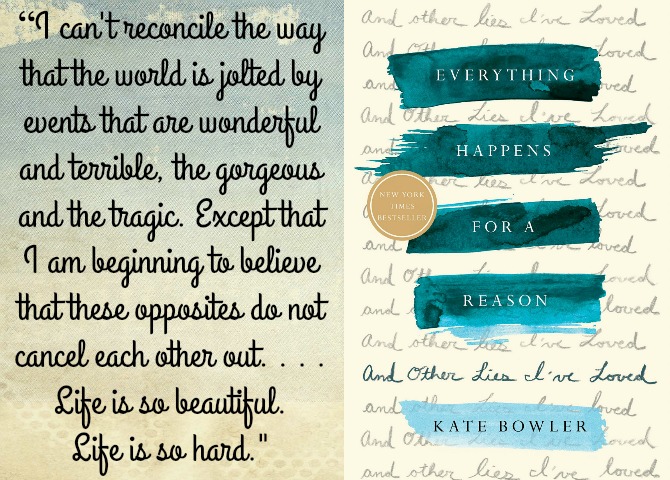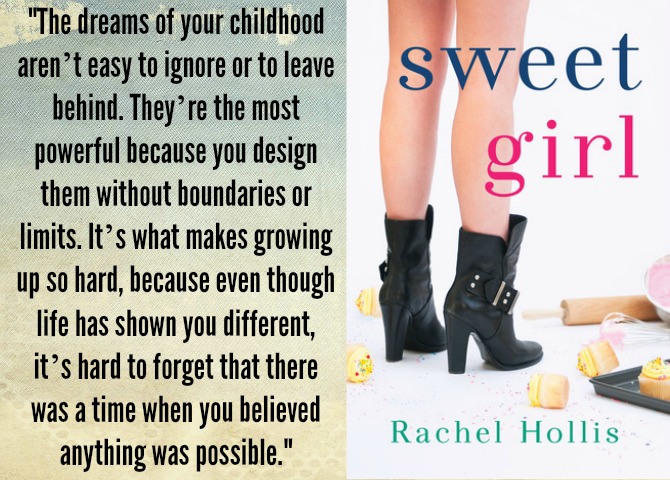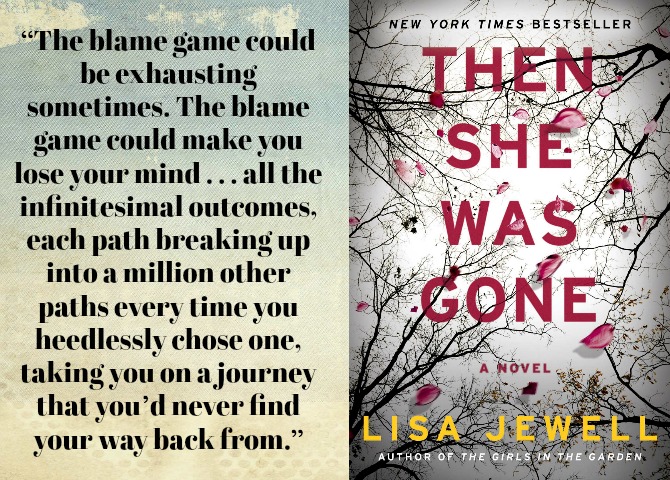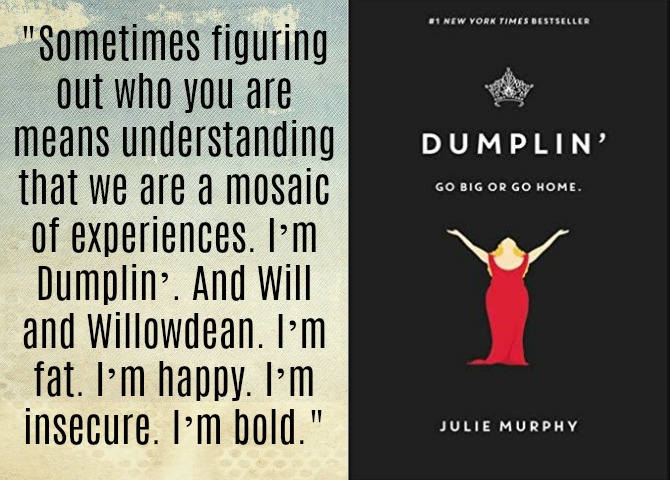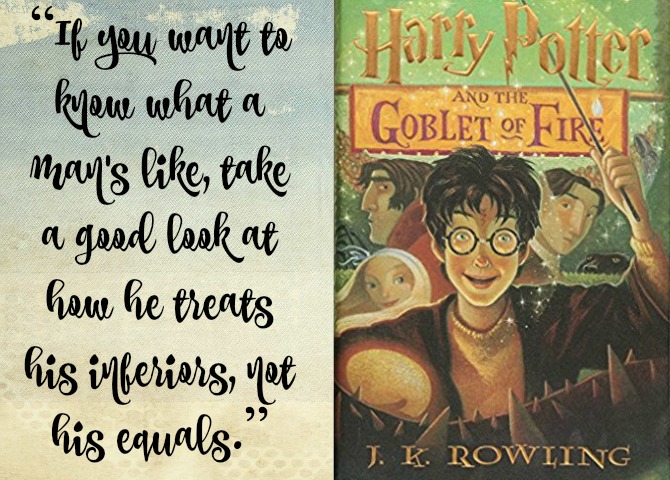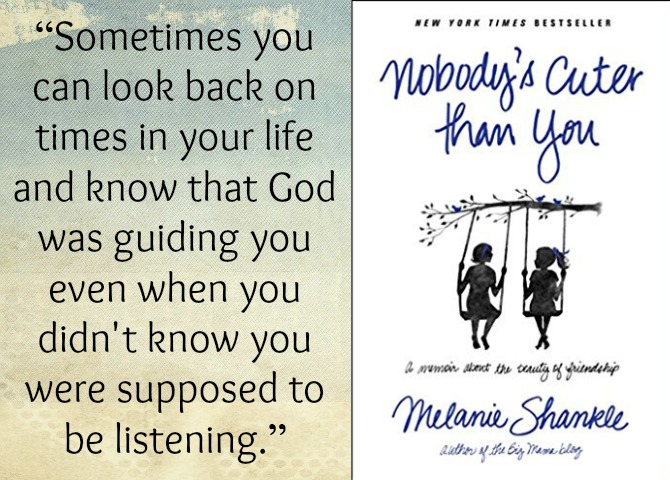It’s Quick Lit week! I’ve got six book reviews for you today, as well six more for you this Wednesday, and another six this Friday. Get your TBR lists ready, because there are some excellent recommendations headed your way (as well as a head’s up on a few books you may want to skip).
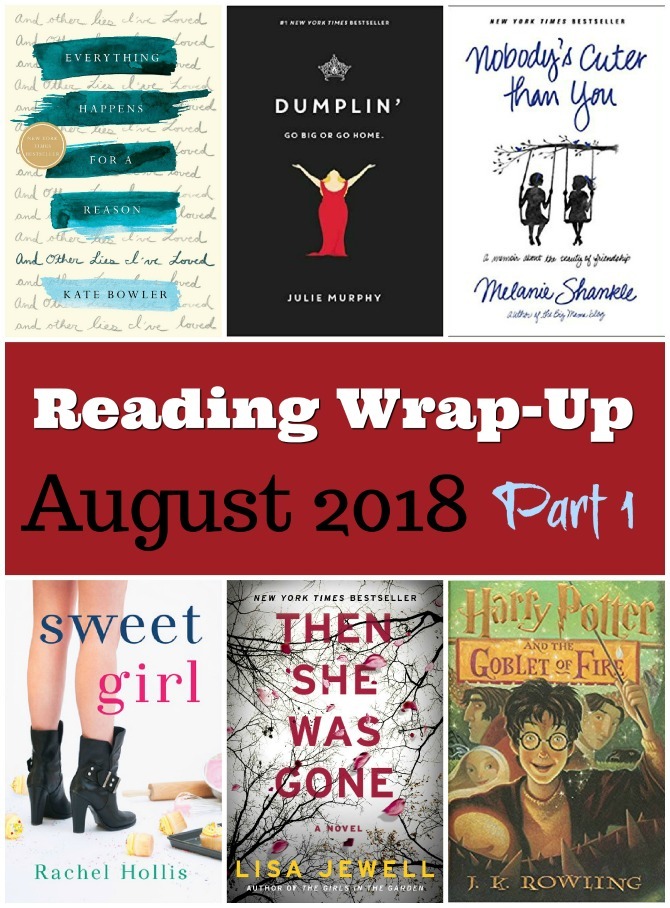
Everything Happens for a Reason: And Other Lies I’ve Loved, by Kate Bowler: Given that suffering is a universal experience, it’s remarkable, really, that there aren’t more books dedicated to the topic. Our culture is seemingly allergic to talking about the hard stuff, and Christians are among the guiltiest when it comes to the “let’s just pretend it doesn’t exist” mentality . . . as though deigning to acknowledge the existence of pain, suffering, hardship, and illness might reflect poorly on God’s image or indicate our own lack of faith. Kate Bowler has no such qualms about calling out suffering as she sees it.
As a historian at Duke Divinity School, Kate had spent years studying the prosperity gospel and its proponents. Then, at age 35, Kate was diagnosed with stage IV colon cancer. Facing her mortality forced Kate to recognize that she’d been tacitly subscribing to this brand of Christianity, and that it no longer fit. In the book, she explores what it would mean to die, leaving behind a husband and toddler son, and she asks why the church insists this is happening to her for a reason. Even as she finds peace and purpose within her diagnosis, she is unable to reconcile the happy-go-lucky Christian answers with her own pain.
Though her subject matter is morbid, this book isn’t. Kate’s writing is humorous, insightful, and at times quite positive. In many ways, the book is a female-voiced read-alike to When Breath Becomes Air; like Paul Kalanithi (a doctor who suddenly found himself the patient), Kate must reevaluate her career and beliefs when they begin to butt up against her personal experiences. Kate has some wonderful thoughts about what one should and shouldn’t say to someone experiencing a personal tragedy, and especially about the absurdity and futility of comparing suffering. She reminds us that all suffering is valid (even “first world problems”—type suffering); everyone is deserving of empathy, so there is no need to engage in one-upmanship when trying to emphasize how much worse we have it than others. This is a lesson I’ve had to work through in the last few years and am glad to see others doing the same.
Kate Bowler’s experience is truly tragic. Horrific. What I have to say next is in no way meant to diminish her experience or her suffering. However, I believe it’s possible to distinguish an author’s work from their value as a human, and so I will (rather cautiously) admit that beyond the good points (mentioned above) I didn’t much care for this book. It is short, with a good chunk of those limited pages spent meandering through other forms of suffering Kate has experienced in her life. Her cancer makes a jarringly short appearance. This was a strange editorial choice that didn’t quite work for me, nor did the clunky blending of memoir and religious criticism.
Not surprisingly, I had many misgivings regarding Bowler’s specific thoughts on God and faith. To be clear, this isn’t because I felt my own beliefs were being dismissed: I personally do not ascribe to the prosperity gospel—I believe that God blesses His children, but I don’t see any Biblical evidence for the Law of Attraction-style message proclaimed by pastors in this realm of Christianity. I also agree with Kate that not everything happens for a reason (or, at least, that not everything happens for a God-ordained reason, because #sin). BUT I do believe that God can redeem everything—even the worst of circumstances; failing to acknowledge His goodness and sovereignty in the midst of our suffering is irreverent and self-defeating.
Kate Bowler spends quite a lot of time discrediting the prosperity gospel, but offers little in its place. I appreciate her willingness to sit with the suffering and the pain (PLEASE let’s get better at that as believers!), but I can’t get onboard with her near dismissal of God from her story. This would have been understandable if the book were nothing more than a cancer memoir, but it presents itself as more than that and sadly it under delivers.
My Rating: 3 stars.
Sweet Girl, by Rachel Hollis: Our Mops book club decided to keep the decision making to a minimum and is sticking with The Girls’ Series for our next few monthly reads. Sweet Girl picks up where Party Girl left off, but follows the story of Max Jennings (the ill-tempered roommate of Party Girl protagonist Landon Brinkley). Max has spent the last six years running away from her mistakes and from the girl she once was. All that remains of her former self is a passion for baking—a passion that is given wings when celebrated pastry chef Avis Phillips unexpectedly invites the moody bartender to work in her kitchen. Max is willing to set aside her surly persona and even overlook Avis’s quirkiness for the sake of achieving her dream, but due to her hypoglycemia, Max needs a friend who can assist in taste-tasting her culinary creations. This friend comes in the unexpected form of frenemy Bennett Taylor. As their friendship develops into something more, Max must come to terms with her past and learn how to feel again.
I didn’t care for this book as much as Party Girl. The writing is even less polished, and Hollis seemed to be trying too hard with the character of Max, whose moodiness and good-girl-gone-goth/tortured soul persona were too clichéd to be believable. On a positive note, there are some very sweet moments as Max matures, as well as some positive messages about pursuing your ambitions and opening up to relationship. I also enjoyed the creative food descriptions and the LA setting. But the story was predictable, the side characters were poorly developed, and I had trouble relating to the angst-ridden Max.
My Rating: 3 stars.
Then She Was Gone, by Lisa Jewell: Ellie Mack was only fifteen years old when she disappeared. She’d been the perfect daughter, and in her absence her family fell apart. Now, ten years later, her mother Laurel is trying to put her life back together after the recent discovery of Ellie’s remains. Laurel’s marriage has been over for seven years, and her adult son and daughter want little to do with the mother who was never the same after her favorite child’s death. But Laurel is ready for a fresh start, which seems to have arrived thanks to a handsome new beau named Floyd. Laurel’s new relationship takes an interesting turn when she meets Floyd’s 9-year-old daughter, Poppy, who is the spitting image of Ellie. As Laurel grows closer to Floyd and Poppy, she begins to put together pieces of what happened to her daughter a decade ago, and she starts to question whether Floyd is the man she hopes he is.
This is a unique book; it’s technically a thriller, and while the sinister tone is present from start to finish, it’s more of a character study than a breathless race to the ending. This is the third book I’ve read by Lisa Jewell, and while all three stories have been quite different, they’ve all featured compelling and complicated characters. Jewell writes precocious children and middle-aged mothers especially well. I enjoyed the character of Laurel, who has faced much sadness and regrets the mistakes she made in the midst of her grief, but who has emerged as stronger, healthier woman who is eager to make amends. The family dynamics present between Laurel, her children, and her ex-husband are unconventional, but it was encouraging to see them survive and even thrive within the awkwardness.
I had the mystery figured out fairly early in the book, but still felt invested in the story, and found the conclusion satisfying and surprisingly redeeming. The subject of disappearing children is a hard one, but in Then She Was Gone, Jewell has woven redemption and hope into the pain. The book speaks to the importance of love, family, and second chances.
My Rating: 4 stars.
Dumplin’, by Julie Murphy: Willowdean Dickson is a self-proclaimed “fat girl”, known as Dumplin’ to her mother, a former beauty queen who is ashamed of her daughter’s size. Despite her mother’s disapproval, Will is mostly comfortable in her own skin and happy with life. She’s surviving high school alongside her beautiful best friend and fellow Dolly Parton-enthusiast, Ellen, and spends her free time working at a local fast-food joint.
Will’s confidence starts to wain when she falls into a secret relationship with Bo, her coworker and longtime crush. Feeling unworthy of Bo’s affections, Will attempts to bolster her confidence in a way that nobody expected: much to her mother’s horror, she enrolls in the Miss Clover City Beauty Pageant. Inspired by Will’s bold move, several other “outsiders” also enroll. Soon Will is juggling pageant preparation with work and school, while also enduring a fight with her best friend and sorting through her feelings related to a new love interest.
I can see that this book would be appealing to the intended YA audience. There are some wonderful insights on life and growing up, as well as a good deal of mature and thoughtful dialogue. The themes of body positivity and finding one’s confidence apart from others’ approval are fantastic. These are issues that every teen deals with, and it’s encouraging to see them addressed in literature. Our protagonist models a positive body confidence and healthy disdain of diet culture, while also experiencing natural insecurities; I loved that her experience as a fat person is portrayed as multi-dimensional and complicated. (An experience that Roxanne Gay’s Hunger helped me understand from a nonfiction perspective.)
Apart from these high notes, this book just wasn’t for me: there’s too much drama, too much talk of teen sex, and way too much angst. The characters have the thoughts and feelings of teenagers, but their dialogue and introspective moments are those of much more mature individuals, and I found the discrepancy jarring. I had an especially hard time with the character of Will who, despite her positive attributes, is not likable: she is selfish and entitled, and hypocritical in her treatment of others. This is most apparent within the love triangle plot line: Will’s affections lie with the popular, good-looking boy, while the kind, smart (less attractive) boy is left pining after her. I hate this double standard that is popular in fiction: women are expected to be loved and admired REGARDLESS of how they look (totally valid), but males do not receive the same treatment (example of the Feminist pendulum swinging too far).
The book’s ending is ambiguous and inconclusive. From an artistic standpoint, I can see why the author chose to end this way, but it made for a very unsatisfying finish.
My Rating: 2.5 stars.
Harry Potter and the Goblet of Fire, by J. K. Rowling: I’ve been reading through the Harry Potter series the last couple of years, following along with this podcast at the rate of one chapter per week. I’m a longtime HP fan and have read through the series a handful of times, but I’ve loved using the podcast as an excuse to return to these beloved stories and to view the books through the lens of the podcast’s weekly themes. Rereading a favorite book is always a bit of a gamble, as you risk the chance of the book’s failing to live up to its own reputation. Thankfully, that has not been the case with this series. If anything, I appreciate the books even more now than I did upon earlier reads. There truly is nothing quite like them—their characters, their themes, the writing style that appeals to both kids and adults. And, of course, there is the wonder I experience every time I open up these books and step again into Harry’s magical world. It never gets old.
Book Four marks a turning point in the series: without abandoning Hogwarts or the security of established characters and relationships, Rowling seamlessly introduces us to the broader Wizarding World. We also meet an embodied Voldemort for the first time, and we begin to see the enormity of all that Harry is facing. The book features some of the most compelling scenes of the entire series. Particularly memorable are the heartbreaking moments between Harry and Cedric during the finale of the Triwizard Tournament.
Goblet of Fire had never been my favorite book of the series, but I get more from it with each reread. This time through, I enjoyed it just as much as Prisoner of Azkaban, which had previously been my favorite of the seven books. I was a little sad when I came to the end, knowing all that is ahead for Harry in the coming books. It feels like the end of an era; thankfully, its a book I can (and will) easily return to again.
My Rating: 5 stars.
Nobody’s Cuter Than You: A Memoir About the Beauty of Friendship, by Melanie Shankle: Friendships are the forgotten relationships—in literature and, sadly, in life. In our digital era, we all have hundreds of “friends” on social media, but very few of us have an inner circle that knows us and that we can count on in a crises. Melanie Shankle is a rare individual whose life has been marked by strong female friendships. In Nobody’s Cuter Than You, she pays homage to the friends that have been there for the big things and small things in life, from girlhood playmates to college pals, and the women who have remained by her side into adulthood. Though Melanie shares stories of various friendships, she devotes the most page space to her college room mate and lifelong bestie, Gulley. The two women have truly “done life” together in a way that is beautiful and inspiring and speaks to the value of a good friend.
This is largely a memoir, but Melanie’s stories serve as a celebration of all friendships. Melanie shares what she has learned about finding and keeping friends, and the way God uses friendship in pivotal ways. I didn’t love this book as much as Sparkly Green Earrings, possibly because I couldn’t relate to Melanie’s experiences; I have had some great friends through the years, including a number of women who I am blessed to be doing life with today, but I have not been as intentional about investing in my friendships as I could or should. Stories like Melanie’s make me sad in a way, because I can see where I’ve been missing out, but they also provide me with the nudge I need to love on my friends just a little bit more. This is easier said than done in a culture that undervalues soul-level community, but it’s clearly a battle worth waging.
I am relatively new to the Melanie Shankle bandwagon, having just started reading her books and listening to her podcast this year, but I am SO happy to have discovered her. She is an excellent storyteller, she’s funny in a dry, self-deprecating way, and she has a knack for cushioning solid truths with lighthearted material so that you’re having so much fun, you hardly realize you’ve just learned something! Sadly, I’ll probably never meet Melanie outside of her work, but I have no doubt she would be a great friend to have!
My Rating: 4 stars.
As always, I’d love to hear your thoughts on any of these books: have you read them? What did you think?
